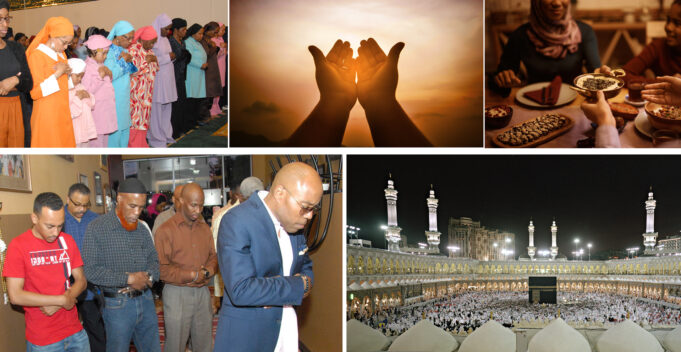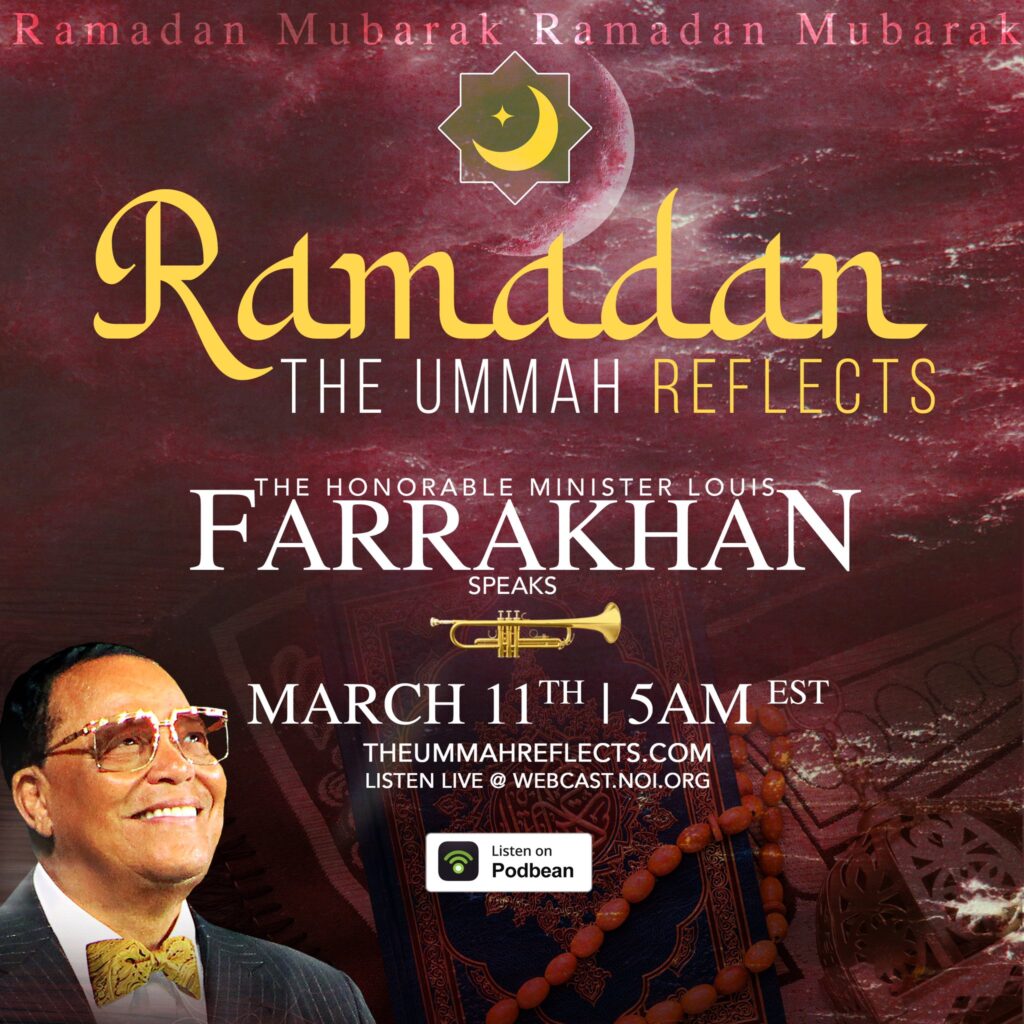Close to two billion Muslims are observing the Islamic holy month of Ramadan in a world filled with war, suffering and genocide. At Final Call presstime, this year Ramadan, the ninth month of the lunar calendar, was tentatively scheduled to start the evening of March 10 if the new crescent moon was sighted, with the first day of fasting to begin on March 11. If the moon was not sighted Ramadan began March 12.
Muslims fast from food, drink and intimate relations between spouses from before sun up to sun down for 30 days this month. Ramadan is the month that Prophet Muhammad, peace be upon him, was visited by the angel Jibril who revealed to the new prophet words from Allah (God) that would later be known as the Qur’an.
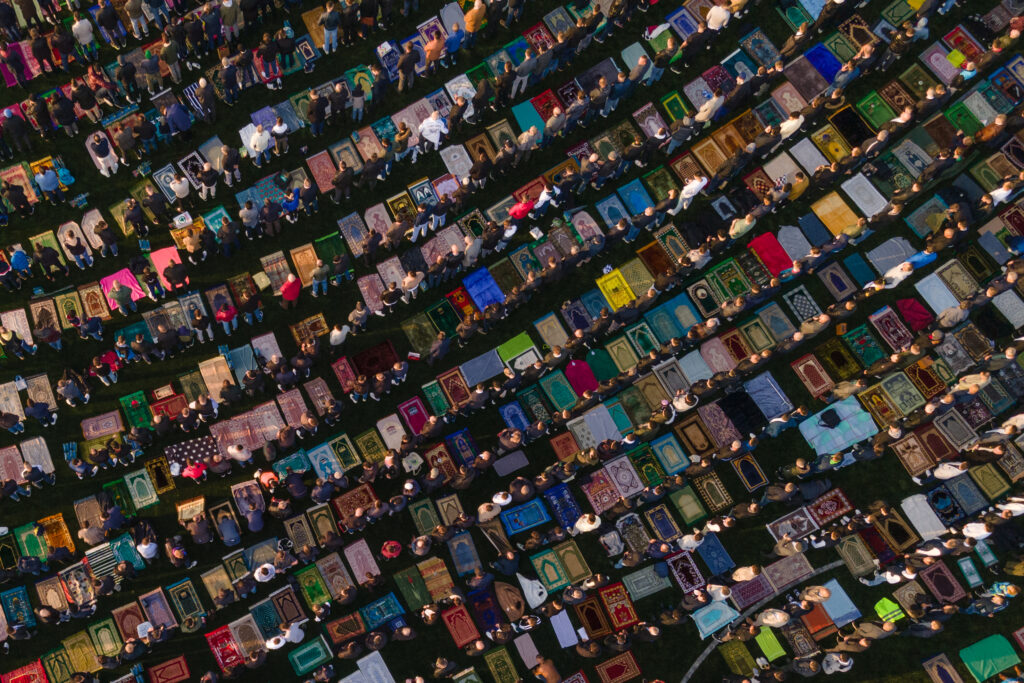
“The Holy Month of Ramadan is a most important time for the righteous of all diverse backgrounds, schools of thought, and cultures because this month of fasting, is in which the Holy Qur’an was revealed. Therefore, the month first spiritually roots the Believer in the Divine Word of Allah (God) as a nourishment to the mind, heart, and spirit.
We collectively strive every Ramadan each year to elevate ourselves through its universal moral injunctions and spiritual guidance,” Nation of Islam Student Imam Sultan Muhammad told The Final Call, in a previous interview.
“We are rooted in our shared struggle to overcome the carnal realities of self that are represented in our abstention from wrongdoing, food, drink, and intimate relations during the daylight with our husbands and wives. As we collectively abstain from these natural universal hungers, the shared reality of our struggle for balance to overcome excess by cultivating righteous virtues,
We deepen our relationship with Allah (God) and one another in all aspects of life to free ourselves from the tyranny of the evils of ‘self’ and others for the advancement of unlimited progress, peace, joy and contentment of mind to establish a new reality through self-purification,” he added.
This year’s Ramadan is significant in a world where some turmoil’s happening, Imam Qasim Amin Nathari, an Islamic scholar and author told The Final Call. “This year makes me reflect on how traditionally, when we look at the history of Islam, some of the most significant battles that the Muslims engaged in happened during the month of Ramadan,” he said.
“We can look at some of the major battles and some of the major victories. These wars were fought at times when Muslims were fasting and doing everything they could to be in remembrance of Allah. Now with the world being challenged the way it is, it just makes me feel that as Muslims, we have to reflect more on one, the world scene, and two, on our personal relationship with Allah,” Imam Nathari continued.
“Often, we become so concerned with what’s happening on the world scene that we forget to continue cultivating our personal relationship with Allah. They’re not mutually exclusive. We can do both.”
Past and present struggles
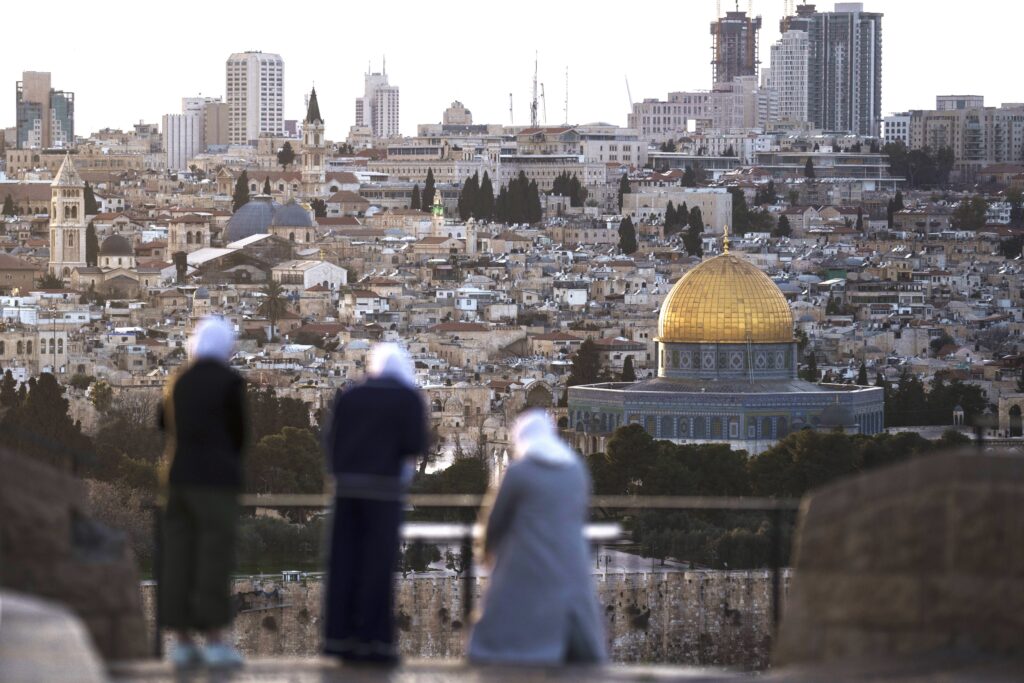
A significant combat in the early days of Islam was during the Battle of Badr, also known as the Battle of Separation. It was fought on the 17 Ramadan 2 AH (After Hijrah), (March 17, 624 CE) between a fierce army of over 1,000 Quraysh and only 313 Muslims. The Muslims’ victory in the Battle of Badr was a turning point for their new community to understand the power of Allah (God).
“In that particular year, during the migration of Prophet Muhammad, peace and blessings of Allah be upon him, this was the first year that fasting and charity were made obligatory upon the community,” explained Islamic scholar Ieasha Prime.
“What’s significant about the battle of Badr being fought during Ramadan, is that the believers were fighting while they were fasting. It means that in the intense heat during this month, this was something that they were enduring.”
She explained that during this battle the Prophet’s companions had few resources. They had to share camels. One would ride while two walked, and then they reversed. Even the prophet would walk while a companion rode. The companions urged the Prophet to ride and let them walk.
“The Prophet responded by saying ‘Do you think that you are a stronger walker than me?’ This meant that he would be with his companions’ side by side. ‘I will be fighting with you side by side. You are not more worthy of blessings than I am, meaning that I also am in need of the blessings that come from the struggle that is connected to this.’”
“We know that the honor of [the Honorable] Elijah Muhammad told us that struggle is necessary in order to establish truth,’” she said, referring to the Eternal Leader of the Nation of Islam. “In this moment, the Prophet, peace be upon him, is teaching us that even our leaders fight on the front lines,” added Sister Iesha Prime.
Another noteworthy Muslim conflict that transpired during Ramadan was the Malê Rebellion, which was a slave uprising that took place in Salvador, Bahia, Brazil, during the final 10 days of Ramadan in January 1835. Despite their failure, the apprehended rebels were dressed in Muslim garb, such as long white tunics and head coverings.
They carried prayer beads and Qur’anic amulets as protection on their bodies. The Hausa and Yoruba Muslims were the main organizers of the uprising, but their numbers according to historians included non-Muslim Africans from different backgrounds.
In 2024, Muslims around the world are watching as Israel threatens to invade Rafah if the hostages captured by Hamas during the October 7, 2023 attack on southern Israel that killed almost 1,200 people, were not released by the start of Ramadan. Israel’s massive military response, backed by the U.S. government has led to the deaths of more than 30,000 men, women and children.
It has also displaced 1.8 million of the 2.3 million Palestinians living in Gaza and turned much of the besieged territory bordering Israel, the Mediterranean Sea and Egypt into rubble and dust.
Minus a ceasefire, scenes of ongoing death and destruction in Gaza will weigh heavily on the minds of Muslims across the region and world going into Ramadan. “It adds a layer of distastefulness and outrage to an already pretty horrendous situation,” Khaled Elgindy, the director of the Middle East Institute’s program on Palestine told the media. “It adds more pressure on Arab governments to at least look like they’re doing something.”
Sister Dr. Aminah Al Deen, Chair Emeritus of the Islamic Studies Department at DePaul University sees opportunities amongst the challenges Muslims are facing today. “I think that every Ramadan has its own significance, and it’s a time for restraint in one sense, but reflection in another sense,” she told The Final Call.
“One of those things is Surah Maida (The Table Spread with Food), where we need to spread the table,” Sister Dr. Al Deen continued, referring to a chapter in the Holy Qur’an.
“We need to set the table, we need to formulate the menu instead of showing up at others’ tables where they have set a menu for everybody to follow,” she said.
“As the Minister [the Honorable Minister Louis Farrakhan] said in his talk, at Saviours’ Day, the Arab countries need to step up for their ethnic brothers and we need to step up for our ethnic brothers, but also keeping an eye on all the things that are happening around us. But set the table.”
Minister Farrakhan addressed the world on Feb. 25 from Detroit, Michigan during the Nation of Islam’s Saviours’ Day convention. His topic was, “What Does Allah The Great Mahdi And The Great Messiah Have To Say About The War In The Middle East?”
“Do you know that our Palestinian family, they don’t have strong friendship in the Muslim world. Why is that? Are we Muslims? Prophet Muhammad, peace be upon him, said, ‘You are not a Muslim if you don’t want for your brother what you want for yourself.’
Now, I know that the Muslim world feels the pain of the Palestinians, but they are afraid—afraid to stand. And from the rostrum, I am asking the Muslim world to stop fearing the consequence of standing,” the Minister stated.
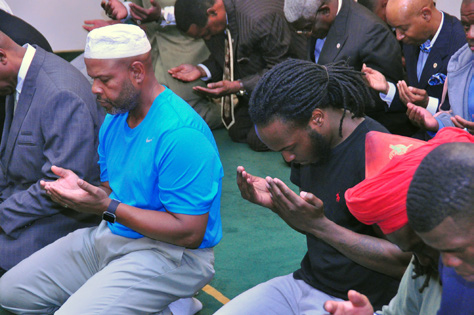
The Holy Month
Ramadan starts by approximately 11 days earlier each year since the lunar calendar follows the moon’s phases. The sighting of the moon is the official start of Ramadan. Muslims believe that the Qur’an was revealed to Prophet Muhammad, peace be upon him, in A.D. 610. That revelation from the Angel Jibril, happened on Laylat Al-Qadar, or the “Night of Power,” during the last 10 days of Ramadan.
Muslims commemorate God’s revelation this month by praying and reciting the Qur’an. Further, they strive to be better people by refraining from gossiping, lying, fighting or arguing.
Fasting from sunup to sundown is obligatory for Muslims, except for the sick, pregnant, nursing mothers, travelers, elderly, or menstruating women. If a day of fasting is missed, it can be made up throughout the rest of the year, either all at once or one day here and there. The fast is not meant to be a hardship.
Many Muslims eat a pre-dawn meal called suhoor, before the first prayer of the day, fajr. The evening meal to break the fast is called iftar and is eaten after the sunset prayer, Maghrib. The fast is often broken with dates and a glass of water, just as Prophet Muhammad, peace and blessings, did.
“For many, Ramadan is a time of great uncertainty in the Muslim world and great uncertainty in the world,” Minister Abdul Akbar Muhammad, International Representative of the Nation of Islam told The Final Call. “It definitely cannot be Ramadan as we know it because of the suffering of so many people in Palestine and other places around the world.”
“For Muslims, Ramadan should be a time of peace. Muslims are strengthening their resolve to make the fast from sun up to sundown. This is what we know Ramadan to be about. We ask our Lord to bless our families and our loved ones, and those who are sick and burdened by anything. We ask Allah to bless us to be charitable during Ramadan, to give to those who don’t have, and to comfort the sick, those that are shut in and to stand by those in Palestine,” he said.
While many around the world are focused on the suffering in Palestine, Sudan and often their own backyards, Muslims are also focused on looking beyond the daily struggles to an ability to attain inner peace.
An incentive during Ramadan for nearly two decades is now a morning podcast for Muslims worldwide. Ramadan: The Ummah Reflects, was recently ranked by FeedSpot as the No. 4 Podcast out of the 15 Best Ramadan Podcasts from thousands of podcasts on the web and ranked by traffic, social media followers and freshness.
Previously known as the Ramadan PrayerLine it allowed Muslims to join a 5:00 a.m. Eastern Time conference call to be inspired by various speakers. The speakers represent communities that empower listeners to begin their fast with purpose and intentions. Last year the morning call moved to a podcast, Ramadan: The Ummah Reflects.
The podcast can be found everywhere podcasts are found. Every morning of Ramadan, a new episode downloads, ready for listeners. For those Ramadan “warriors” who want to listen live at 5:00 Eastern Time they can download the app Podbean to their smartphone and search for Ramadan: The Ummah Reflects. Daily speakers include the Honorable Minister Louis Farrakhan, Imam Siraj Wahhaj, Imam Zaid Shakir, Sis. Dr. Aminah Al Deen, Sis. Dr. Safiyya Shabazz and many more.
Ramadan tentatively ends April 10 with Eid al-Fitr celebrations or the “festival of breaking the fast” For many Muslims, this celebration starts with communal morning prayers. Some communities offer days of festivities, with prayers, lavish meals, and gift exchanges while visiting family and friends.












